August, 2022: Kenkelie Community Borehole Well Project Complete!
We are excited to share that there is now a safe, reliable borehole well at Kenkelie Community. As a result, community members no longer rely on unsafe water to meet their daily needs. We also conducted hygiene and sanitation training, which focused on healthy practices such as handwashing and using latrines.
"I used to fetch water from the stream," said 13-year-old Yatu. "The way to Kora stream is far and the area is dangerous for me alone to fetch water. I would wait to go along with other people to fetch water and return to the house."
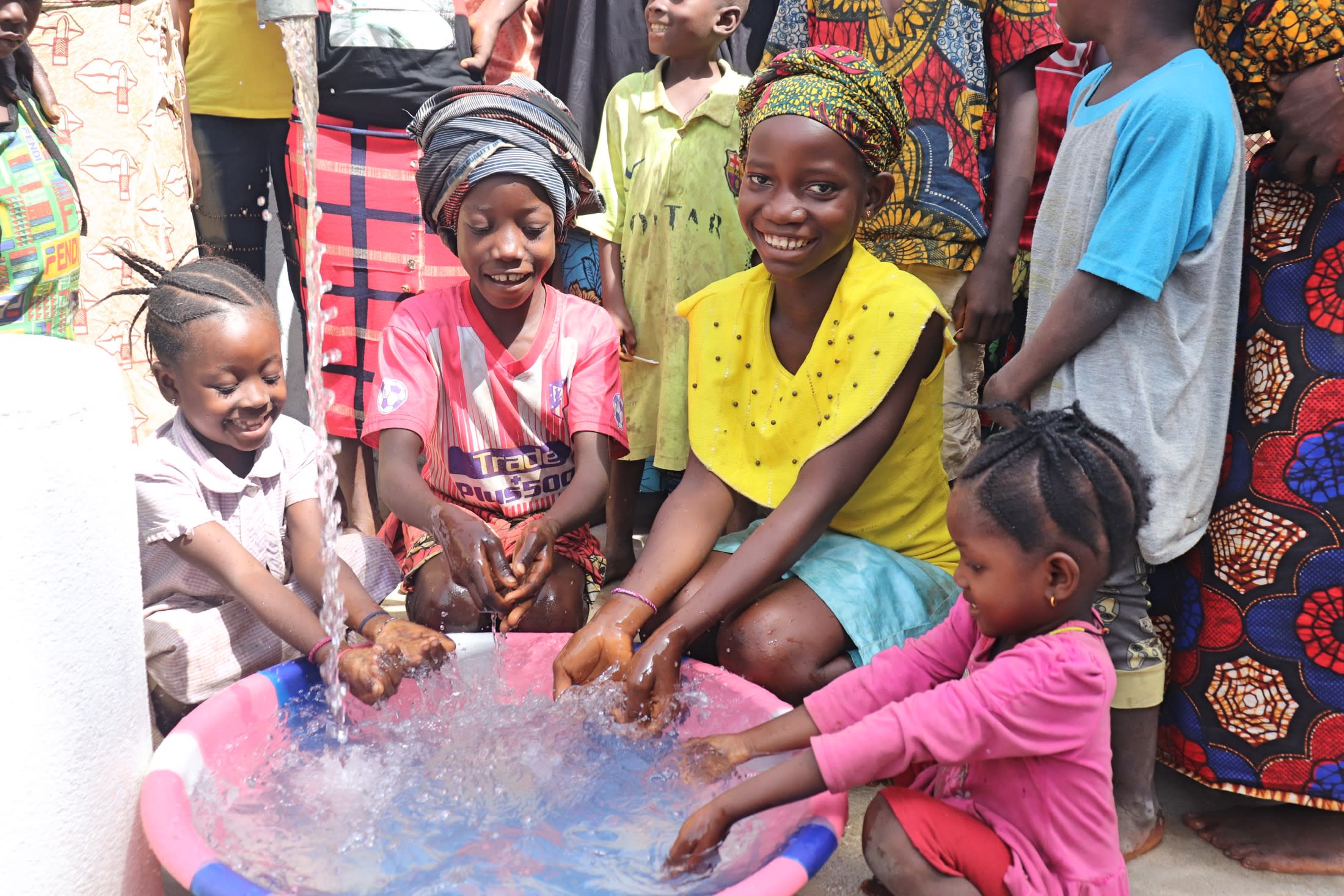
Yatu, in the yellow shirt, splashes water with other kids from Kenkelie.
"Going to the stream every day to fetch water was not an easy task for me," Yatu continued. "I had to carry a heavy bucket of water on my head to bring to my house and I [made multiple] trips of water to serve my family. The stream water would get dirty because of the way people fetched or used it. I had to wait until it got clean before I could fetch water."

Yatu at the new well.
"The new pump is good, and I can now get clean water to drink," Yatu said. "I [won't have to] wait for anyone to fetch water because the pump is at the center of this village and opposite my house. I can just walk to fetch water from the pump."
"This new pump can provide me enough water to do everything that I must do before going to school," Yatu concluded. "My mother will not struggle to use [a] little amount of water to cook, and everyone at the house will bathe with enough water. This new pump is now helping me to do all my daily activities quickly, and I am happy for that."
"It was not easy to fetch water in this village," said 41-year-old farmer Koloneh Kamara, who we interviewed when we first visited Kenkelie.

Koloneh fetching water before versus now.
"It is not easy to fetch water from the stream, especially when I had to make [multiple] trips. The stream water is dark in color, and sometimes it is filthy when the demand to fetch water is high."

Koloneh, in the pink shirt, smiles as one of the community elders fills a container with water.
"It is good that we now have a new pump in this village that is easy to access and at my own will. I am happy because I had suffered to fetch water from the stream. I cannot hesitate to drink the pump water because it is clean, and chlorine is applied to it, which is making the water safe for us to drink," Koloneh said.
"From now henceforth, I will not be fetching water from the stream. Drinking water from this pump will protect me from getting sick. I can also fetch enough water from the pump that I will store to use anytime there is a need for water at my house. It is now good that I have access to this new pump that is close to my house, at which I can fetch enough water to complete my palm oil production. Other domestic activities like laundering of clothes, cooking, and bathing are quite easy now to complete because there is enough water from this pump that I will easily fetch to my house."

We held a dedication ceremony to officially hand over the well to the community members. Several local dignitaries attended the ceremony, including representatives from the Port Loko District Council, the Ministry of Water Resources, and the Ward Council. Each official gave a short speech thanking everyone who contributed to this water project and reminding the staff and students to take good care of it. Then, Yatu and Koloneh made statements on their community's behalf. The ceremony concluded with celebration, singing, and dancing.
New Well
The drill team arrived the day before beginning work. They set up camp and unpacked all their tools and supplies to prepare for drilling the next day. The community provided space for the team to store their belongings and meals for the duration of their stay. The following day, work began.
Our team dug two pits next to the drill rig, one for the drill’s water supply and another for what the drill pulls out of the borehole. In some cases, we order a private supplier to deliver the water for drilling since water access is already challenging.
Day one of drilling began as the team mixed water with bentonite, an absorbent clay, in the two dug pits. Next, the team fixed a four-inch carbide-tipped bit to the five-foot-long drill stem. They started the mud pump to supply water to the drill rig so that drilling could begin!

After putting each five-foot length of drill stem into the hole, the team took material samples. We labeled the bags to review them later and determine the aquifer locations.
On the second day of drilling, the team expanded the hole and cleared it of mud. After reaching a total depth of 21 meters, the team forcefully pumped clean water into the well to remove any dirt and debris from the drilling process. We then protected the screened pipe by adding a filter pack. The team hoisted the temporary drilling casing to fortify the pipes with cement.

Next, we bailed the well by hand for three days before conducting a yield test to verify the water quantity. This well has a static water level of 12 meters. With these excellent results, we installed a stainless steel pump. Water quality test results showed that this was clean water fit for drinking!
New Knowledge
Before conducting any hygiene training, we called and visited the local water user committee to understand the community’s challenges and lack of sanitation facilities. We shared the findings from our discussions with the committee members to help them make the necessary adjustments before the training began. For example, we identified households without handwashing stations or ones that may need to repair their latrines. With this information, community members worked together to improve hygiene and sanitation at home.
After this preparatory period, we scheduled a time when members from each household using the water point could attend a three-day hygiene and sanitation training. We then dispatched our teams to the agreed-upon location to hold the meeting.

Training topics covered included handwashing and tippy taps, good and bad hygiene habits, disease transmission and prevention, COVID-19, worms and parasites, proper dental hygiene, proper care of the well's pump, keeping the water clean, the cost recovery system, the importance of using dish racks and clotheslines, the importance of toilets, keeping latrines clean, balanced diets, the diarrhea doll, and HIV and AIDS.

The most notable topic was when we compared good versus bad hygiene practices, during which the entire assembly went silent out of guilt. All of the latrines in the community lacked doors and covers, which means excrement can easily be tracked into households by wildlife and humans. The children of the community have also been practicing open defecation, which can spread disease easily.
Another topic that caused a lot of discussion was nutrition, which we demonstrate using a three-legged stool that represents major food groups: when one leg of the stool is taken away, the whole stool falls. Kenkelie's people held a lot of traditional beliefs with regard to certain foods like eggs, fish, and bananas.
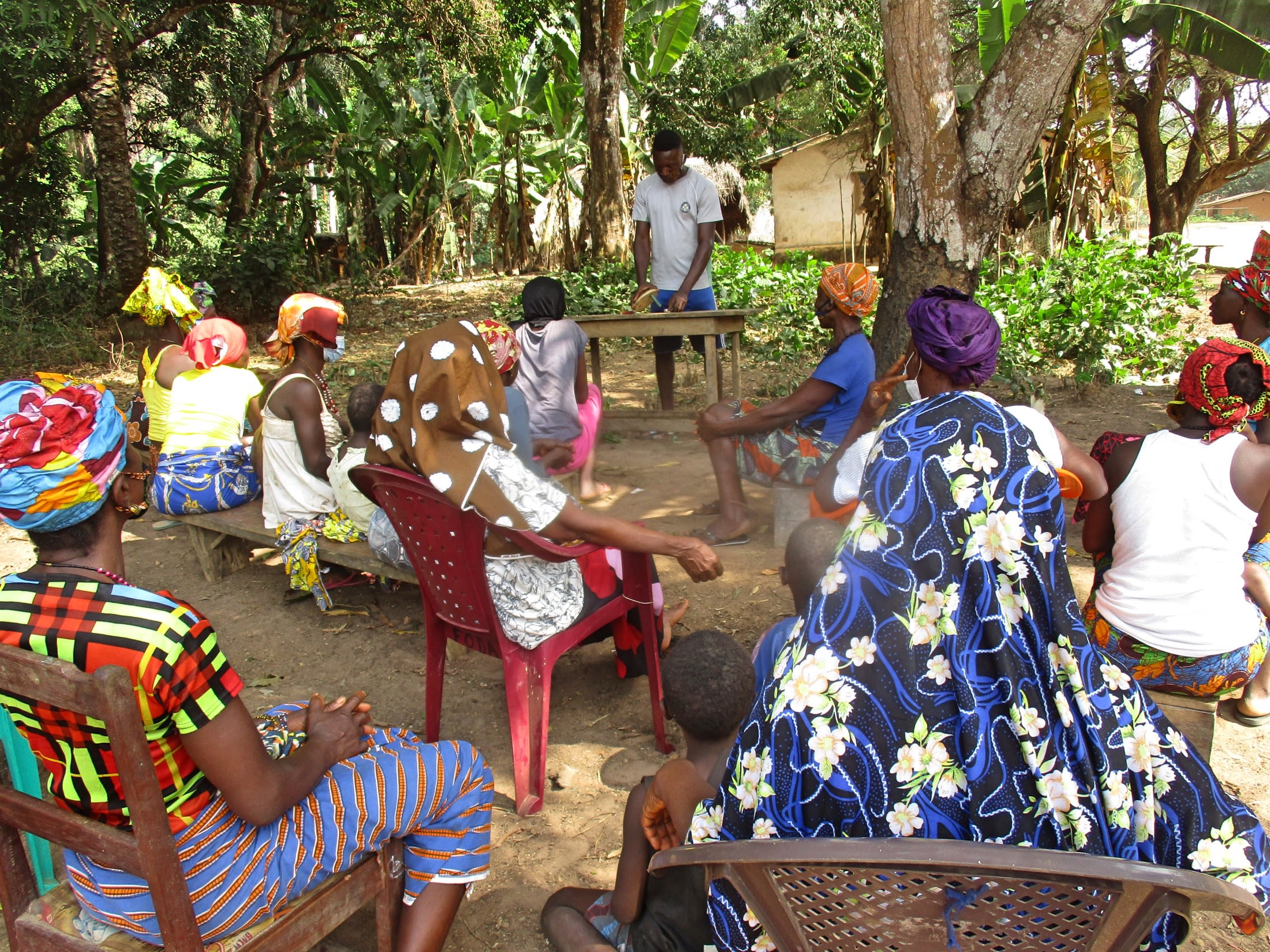
The three-legged stool in action.
One local church leader stood up and said that these beliefs are outdated, and when he recently went to the health clinic the staff there told him that eating these foods won't cause disease and will actually help him live a healthy life and boost his immune response. Everyone gathered applauded his statement, thanking him for his story.
30-year-old trader N'mah Suma shared what she learned during the training. "This training is very important to me because it has really helped to change my life for the better. Before, I was never aware of the bad practices that I was doing because I had little or no knowledge about how harmful they were to me, my community, and [my] family. I personally was just practicing what I believed was best for me without listening to anybody, not knowing that I was just harming myself."
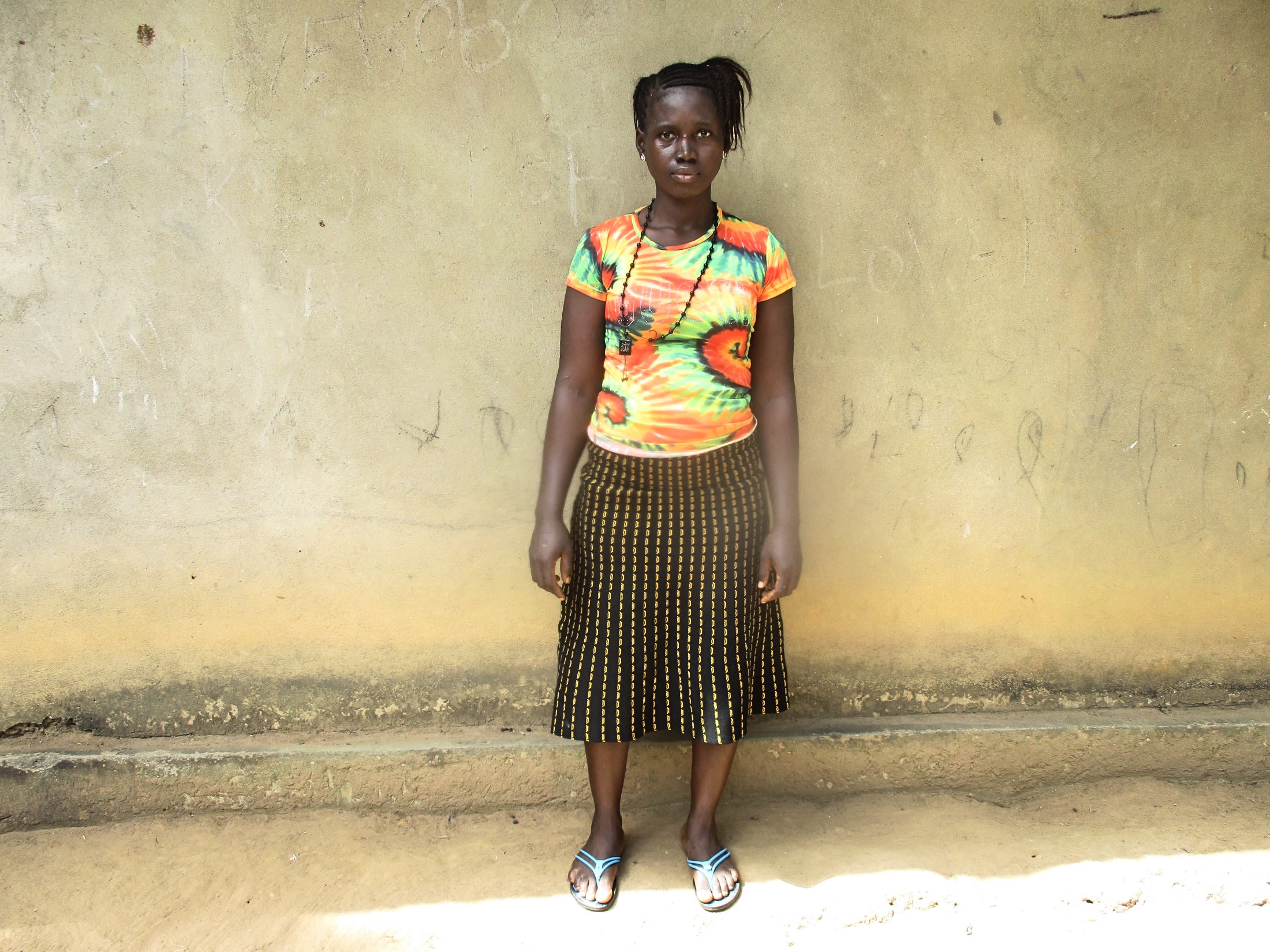
N'mah on the day of the training.
"I never knew that giving children good foods, mostly eggs, fish, and fruits, helps them grow healthy and strong. In the area of personal hygiene, cleaning our teeth is very important because some of us have never in life had the opportunity to have formal education. But with the knowledge from this training, I can now take proper care of myself, children, and [our] environment, and I am encouraging my fellow community members to do the same."
Conclusion
This project required a substantial collaboration between our staff, our in-country teams, and the community members themselves. When an issue arises concerning the well, community members are equipped with the necessary skills to rectify the problem and ensure the water point works appropriately. However, if the issue is beyond their capabilities, they can contact their local field officers to assist them.
Also, we will continue to offer them unmatchable support as a part of our monitoring and maintenance program. We walk with each community, problem-solving together when they face challenges with functionality, seasonality, or water quality. Together, all these components help us strive for enduring access to reliable, clean, and safe water for this community.
With your contribution, one more piece has been added to a large puzzle of water projects. In our target areas, we’re working toward complete coverage of reliable, maintained water sources within a 30-minute round trip for each community, household, school, and health center. With this in mind, search through our upcoming projects to see which community you can help next!
Thank you for making all of this possible!

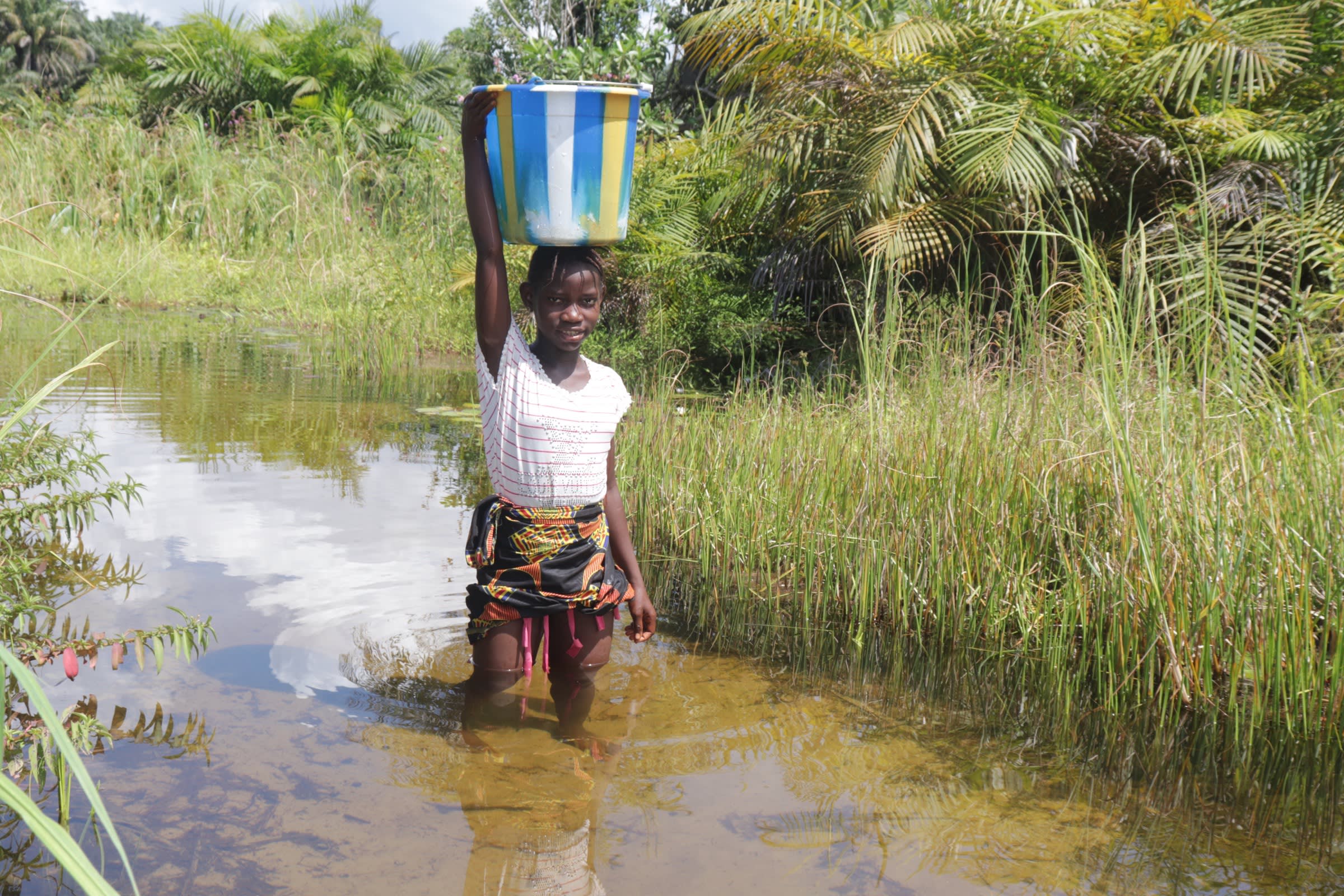
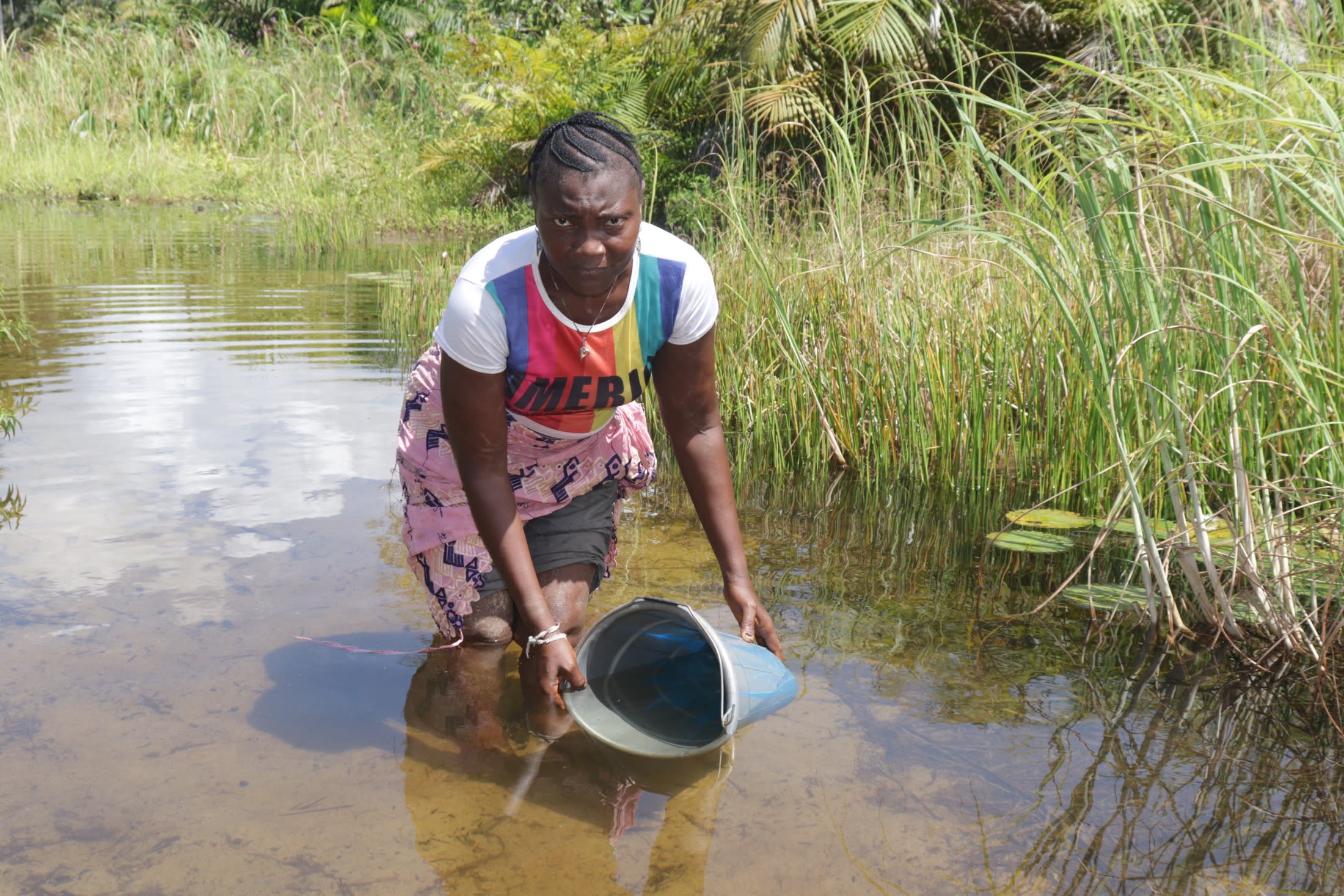

 Borehole Well and Hand Pump
Borehole Well and Hand Pump
 Rehabilitation Project
Rehabilitation Project
































